Steph W. from SEOPressor


...help you check your website and tell you exactly how to rank higher?


88
score %
SEO Score

Found us from search engine?
We rank high, you can too.
SEOPressor helps you to optimize your on-page SEO for higher & improved search ranking.
By allysa on November 29, 2016

Search engine marketing has transformed in the last decade, as the algorithms involved have gotten more sophisticated and intuitive at predicting what users want from their searches.
One of the side effects of this evolution has been to push content marketing and search engine optimization closer together. There are many SEO consultancies out there still peddling the same old techniques from 2012, but the effectiveness of their approaches is diminishing by the day.
Equally, there are plenty of content marketers out there who claim to be able to write great quality content, but abandon even the most basic optimization practices, meaning their work will be all but useless in attracting new, organic audiences.
In 2016, it is getting harder and harder to see the distinction between content creation and SEO best practices. To put it in a nutshell, SEO creates demand, and content marketing fulfills that demand.
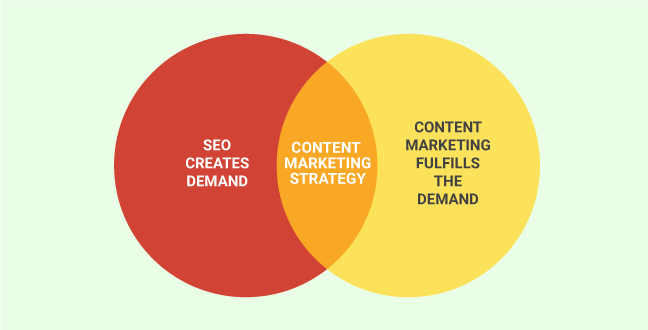
Once you understand both, you have a content marketing strategy, and not just as series of tricks.
Now, if you’ve wound up here organically from Google (hooray!) then I should mention we’re an SEO developer with a content marketing focus.
Our whole purpose is to help these two things blend more seamlessly together.
As a result, we’re in an ideal position to share some ideas with content marketers like you. Basic SEO can massively improve the performance of your work (not the quality! I’m sure you’re awesome at what you do).
Equally, we can introduce SEO practitioners to the fundamentals of content marketing, so you can understand how to fulfill the expectations of the people you’re drawing to your site better.
What is SEO? SEO is the foundation of successful content marketing. If that’s come as a surprise to you, and your website is doing pretty well without SEO, then boy is this an exciting time for you. Get a handle on these core principles and use them to guide your work, and your results will increase exponentially. Seriously.
Search Engine Optimization is a process designed to maximize the number of people visiting your site through organic means. Namely, through their searches on sites like Google and Bing. It allows your content to be found by people looking for the kind of things you’re writing on.
Here, we’ll break down each of these so you know exactly what you’re trying to do, and why.
Keyword research is the bread and butter of SEO. It allows marketers to identify the gaps and opportunities in the market. Individuals can analyze how popular a search term is, as well as how competitive it is (that is, how many other websites are trying to target it).
If you can find a keyword that is disproportionately popular, or disproportionately uncompetitive, you just found an opportunity!
Knowing the keywords for your niche and industry is essential. It will help you gauge how you are ranking in the search engine results pages (SERPs) for those terms. Once you know your starting point, you know how much work you have to do on that keyword to end up on the first page of results.
Doing this research effectively will require several tools. Fortunately, we’ve got you covered:
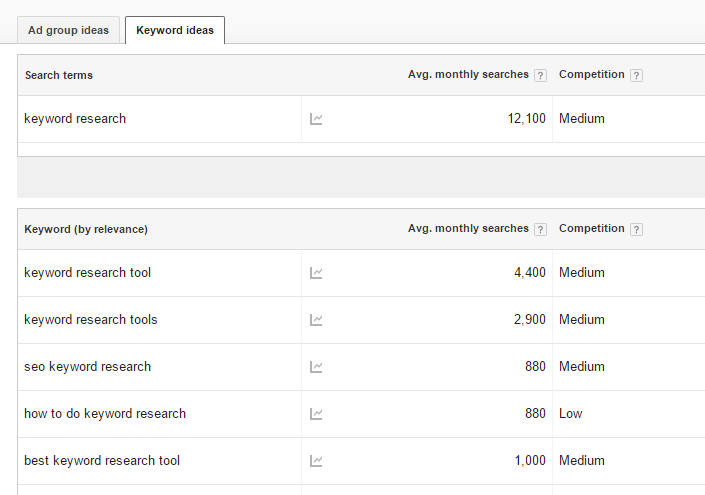
Keyword Planner by Google AdWords is a free tool that can help you to look for more keyword ideas and analyze the performance.
This is a function of AdWords specifically designed to do a lot of the work for you, and help you see what keywords you should be targeting to increase your traffic. As Google has a vested interest in connecting users to relevant content, they provide this for free. They want you to succeed. So do we!
ii) Google Trends
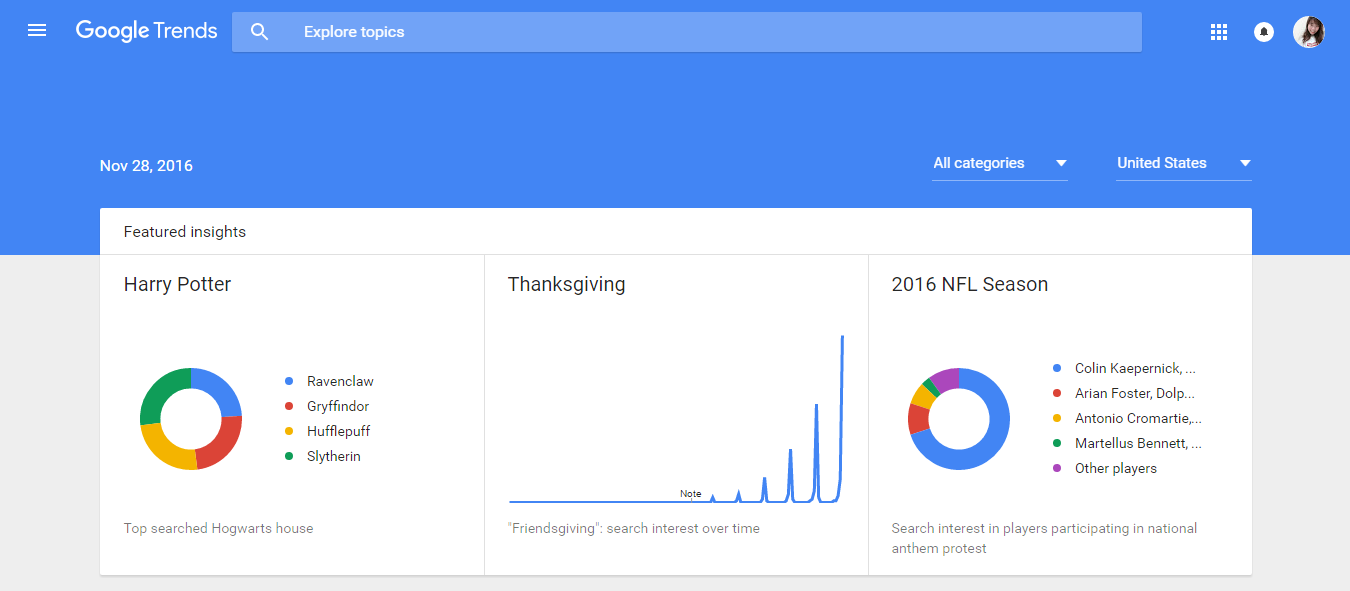
Google Trends helps to find out which is the current trending keywords so you wouldn’t be left out in the market.
This feature allows you see the bigger picture outside your niche and flags up the bandwagons you should be jumping on to develop short-term spikes in traffic motivated by the hunger for current affairs content.
iii) Answer The Public

People ask questions everywhere online and often, the answers are too big to fit in a comment section.
This is a fascinating resource that tells you the kinds of questions people are asking on every topic. Once you know the most popular questions, you can simply answer them in order to get traffic. This is again a free resource.
With three free tools and little else, you can completely transform your strategy from being focused on what you want to write about, or what you imagine people think might be helpful, to what audiences are really looking for.
Focusing what you provide on what people actually want is the most fundamental principles of business. If you don’t want to do this, you should stick to journaling. If you can take this approach, you’ll end up more powerful than you can possibly imagine.
How people use search engines is constantly evolving, and often search engine algorithms are a step behind the times. By getting into that knowledge gap between current behavior and current provision, you can put yourself ahead of the algorithms and seize an advantage.
This knowledge is based on insights around how people use search engines, the language they use when doing so, and what this means for strategy.

Google Instant’s Autocomplete Suggestions allow you to understand your audiences by looking at the keyword suggestions Google offers.
Search Engine Watch is a great resource that will help you understand how people use search engines and why it should matter to you.
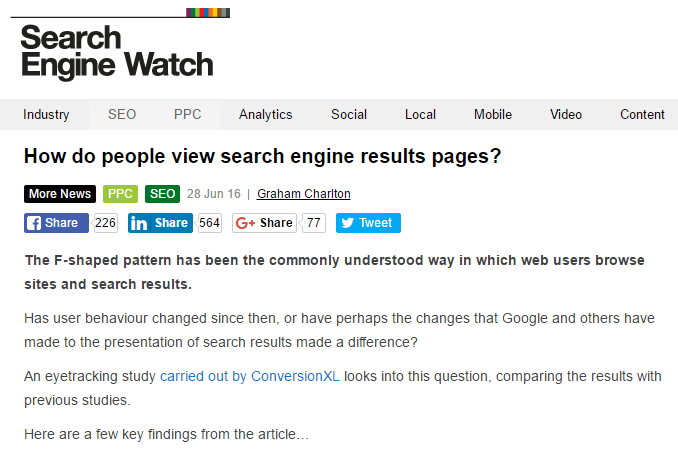
In this article, they’ve created a fascinating combination of eye tracking and other hardcore research to give you a number of take-homes on search engine use right now.
The TL;DR version: The top three results still get the most attention, but the way Google is formatting the homepage, preferencing imagery and video content and streamlining ads to the top left rather than the barren right side of the page, has changed the way people determine what to click on.
Ultimately, content marketing is most effective when it alleviates concerns, answers questions, solves problems and reveals secrets. Understanding how search works, and how people interact with search engines, will offer plenty of opportunities to tick these boxes in the most effective way possible.
The value of content is a really tricky thing to nail down because so much of its value is in the qualitative effect it has on audiences, where all metrics are quantitative.
That said, Azfar has written a great article on how to better assess the performance of your written content using these metrics to infer ideas about quality. That should give you a great introduction to thinking about how well you’re writing for your audience.
The SEO value of content is an important part of this measurement process. By measuring the SEO effectiveness of your content, you’re understanding how your content is helping your attempts to build an audience.

SEOPressor Organic Traffic: It may take some time to see the effect of your SEO efforts, but the results will surely pay off.
Using Google Analytics, you can understand the amount of organic traffic your content is generating, what kind of links it is attracting on other sites, and even help you assess your overall search positions on keywords in your niche compared to the competition.
Authority links are influential sites that link to your content. This is a huge boon to your attempts to develop your audience for two reasons.
The first is that authority backlinks will help your site rank higher in keyword searches by users on Google, attracting organic traffic.
The second is that authority sites almost always have huge audiences, and having your work linked will mean individuals will come from those sites to yours.
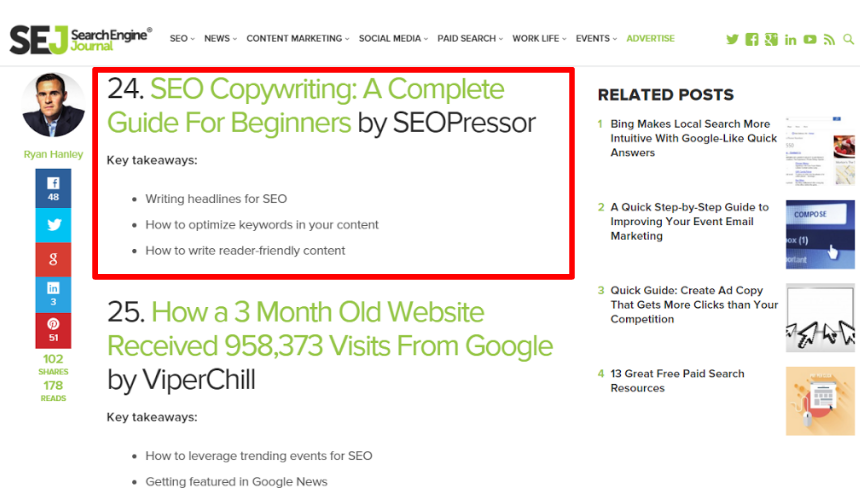
Our blog post, “SEO Copywriting: A Complete Guide For Beginners” is featured on Search Engine Journal, and the traffic has been increasing since then.
The most straight-forward way of attracting authority links is to create outstanding quality content that people will link to rather than attempt to write about themselves.
Another way is to create a controversial or highly debatable piece of content that will see people sharing it in order to discuss the merits of your arguments. The other most popular way is to create viral, shareable content that is highly entertaining.
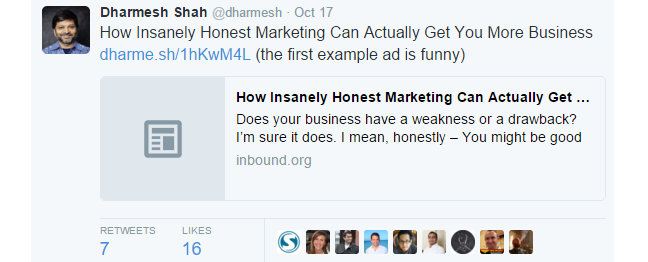
Azfar’s blog post about Honest Marketing was shared by Hubspot founder, Dharmesh Shah that it gets huge exposure and the traffic spike afterwards.
Beyond that, we’ve written a great article on kick starting your link earning campaign, which is a brilliant strategy to develop high-quality backlinks. Basically, you have to think in terms of what value you’re adding for journalists that will make them link back to you.
Think of it like this: if you have hard data which is broken down in a clear and concise way, fully sourced and properly cited, you’ve saved a journalist time and you’ve created a resource of value. Now, rather than having to do that work themselves, they can link to your work.
If you can do this, you’ll massively increase your domain authority, which will pay dividends.
If you’re completely married to your art, and feel like it would sully the work to spend so much time courting computer scripts, then simply reframe it in your mind. SEO is the map to your buried treasure.
Tell yourself whatever you need to tell yourself to get yourself working on it, and I promise you, your writing will be better off for it.
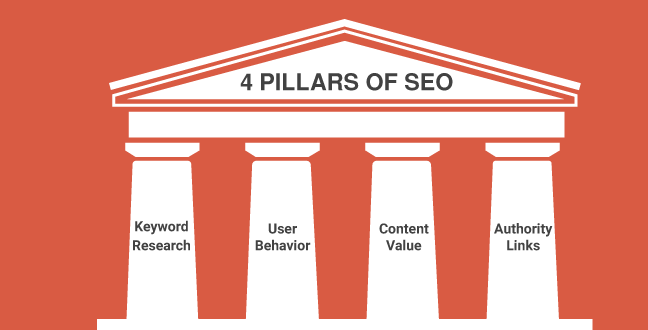
These four pillars of SEO will give you measurable results and transform your success if you aren’t using them already.
And now, we’re going to flip the coin. We’ve talked a lot about what content marketers can learn from SEO practitioners. What can those SEO practitioners learn from content marketers?
There’s a fascinating book you should read if you haven’t already. The Storytelling Animal: How Stories Make Us Human. Whether it’s theater, film, TV, novels, anecdotes in the bar, speeches at weddings, religious texts, or online journals. We are addicted to stories. We are made to create and sustain them, to share them.
In ancient Greece, the theater was developed as a feeling box: a safe space for people to feel things, to live through challenges, and to experience catharsis – the release of emotions that have been pent-up or repressed.
In modern marketing, storytelling taps into the very nature of human beings. Storytelling creates empathy. Not just in an artsy way – in brain imaging scans. That means by taking your audience on the journey of a story, you can make them think how you want them to think.
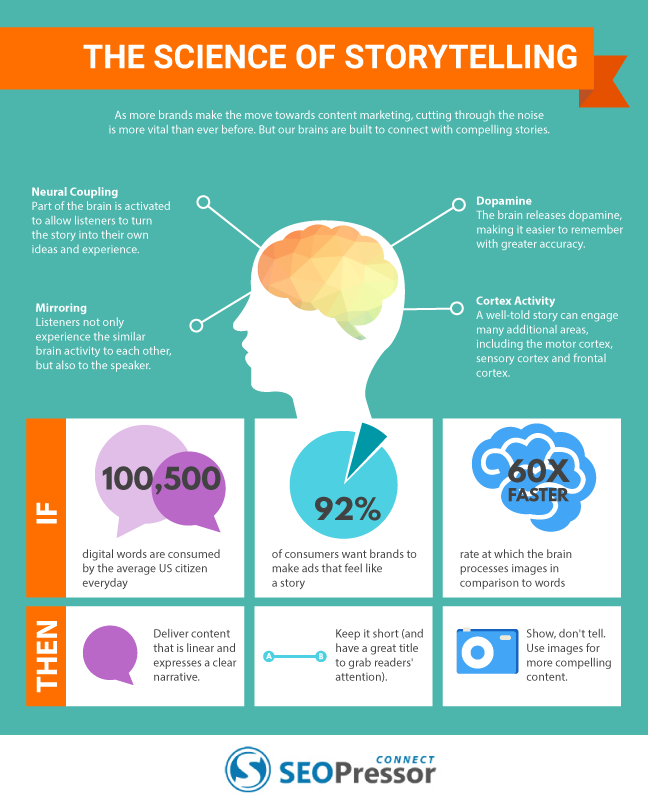
Brain activity in the storyteller and the audience mirror one another.
This will be a challenge. We prize our storytellers above almost all others – actors, directors, writers – and so being one of the best is to be in rarefied air. Increasing your creativity in your delivery can mean increasing your creativity in your SEO approaches, too.
We’ve written a great introduction to the importance of storytelling in your marketing and content. For a full exploration, give it a read.
Audience focus is the single most important thing you can learn from great content marketing. In practical terms for your SEO content, it means being as targeted as possible with your approach.
Any content you develop has to address the needs your target audience faces. A simple example would be a fly fishing tackle site explaining how people can create lures, instead of writing about what fish someone caught using their tackle.
The first is rich content that solves a problem and helps people see how they can utilize the products on offer. The second could just be that a champion fisherman is better than your customers at fishing.
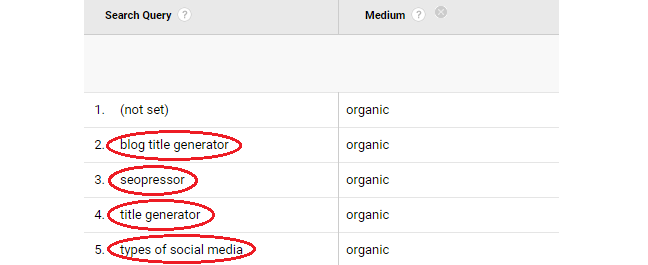
Understand your audiences by getting the data on the most searched keywords at your website from Google Analytics.
Being audience focused means attracting the right kind of traffic. Pay attention to the specific behaviors and keywords used by your target demographics – language use is radically different in baby boomers to millennials.
Understanding tone of voice is crucial for content marketers to address and engage their audience effectively. It can be just as important to you in targeting the right keywords.
This goes not just for tone, but for the experience. Broken links annoy the hell out of people, make the experience worse, and so Google will punish your site for having broken links. You’ll then get punished again because users won’t spend time on your site, and it’ll be deemed “low quality” because of it. Fix those broken links!
We used to say “content is king”. This bred SEO techniques based on churning out huge volumes of low-quality content and stuffing it with as many keywords as possible.
In 2016, quality is king. Algorithms have caught up and that game is over. It’ll even do you more harm than good. All you can do now is create the best quality content that will actually achieve in real terms what you might have been trying to ‘cheat’ beforehand.
Content marketers put their name on what they write.

My name is in this article. That’s because I stand behind it, and I believe it’s of a high quality.
It will educate, inform, solve problems, and hopefully in a way that’s at least a little entertaining and engaging. You should be creating content you’re proud to put your name beside.
If you do so, it’s all good news for your SEO strategy. Quality is now a ranking factor. If someone comes to this article having searched “what should a writer know about SEO” or “What should an SEO know about writing” then I hope they’ll be satisfied that I’ve provided those answers. That will help this rank higher on those longtail keywords.
For writers and SEO practitioners alike, putting the focus onto evergreen content is probably going to be the most rewarding strategy. This content will continue generating traffic for as long as questions remain in people’s minds, and that means it’s worth putting in the extra effort to make that content amazing.

Even though this topic has been written by many content marketers, but it still received many positive feedback from the readers and they love it.
I told the content marketers that they needed to think of SEO differently if it was causing them moral or artistic problems. Similarly, if this all feels like fluffy nonsense to you, you have to reframe it to open yourself up to the success it can bring you.
There has never been a better metaphor for what is going on right now with SEO and content marketing. Both disciplines evolved independently of one another. But as a result of changes in the online environment, they must now act more similarly to one another in order to solve their respective challenges.
As such, content marketers and SEO practitioners need to understand and respect the strengths of one another’s disciplines. They also need to incorporate one another’s practices if they are going to have any significant success. You can also check your SEO score on Website SEO Checker.

Website SEO Checker calculates your website’s SEO score for free.
SEO requires excellent content in order to succeed, while excellent content needs SEO to find an audience. SEO is the strategy, Content is the delivery. A great plan left unexecuted achieves nothing. Execution without a plan leads to chaos.
It’s time to see the two disciplines become one. An integrated model can deliver better results for both parties.
Have you identified any key factors in content marketing that SEO can do better? Do you have knowledge of an important part of SEO I’ve missed that content marketers need to know about? What frustrates you about working with content as an SEO, and vice versa? What excites you? Get the conversation going in the comments below.
Updated: 12 February 2026


Save thousands of dollars (it’s 100x cheaper)

Zero risk of Google penalty (it’s Google-approved)

Boost your rankings (proven by case studies)
Rank High With This Link Strategy
Precise, Simplified, Fast Internal Linking.
